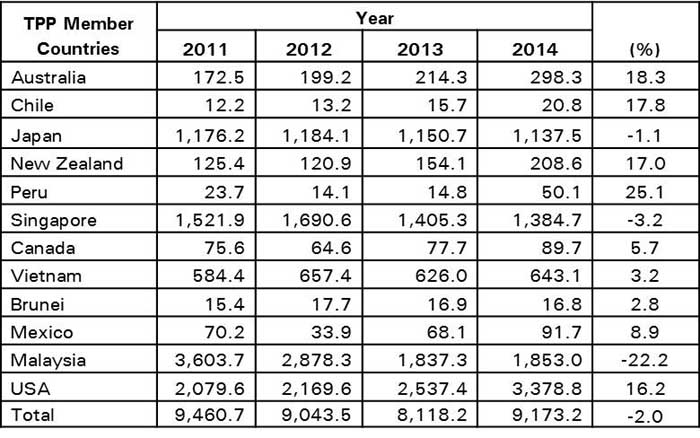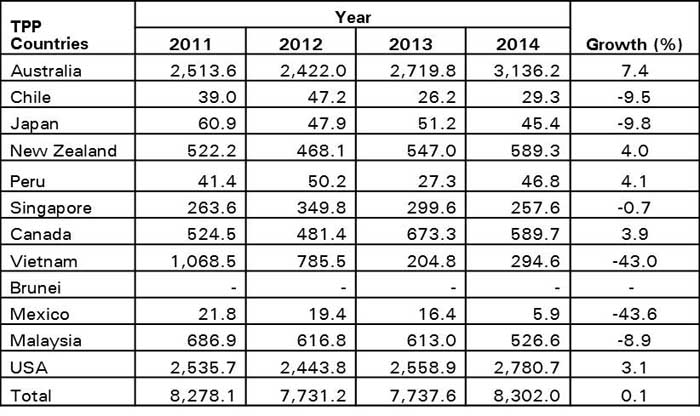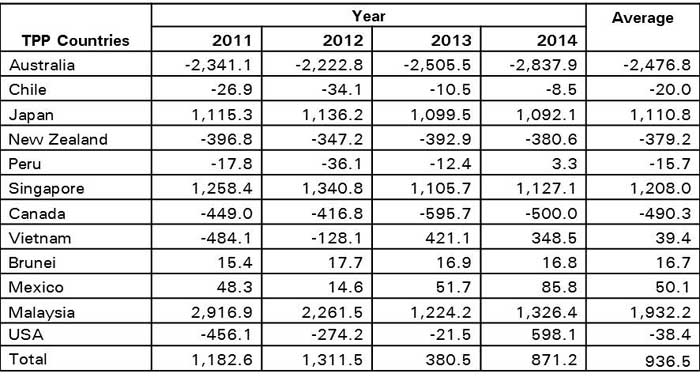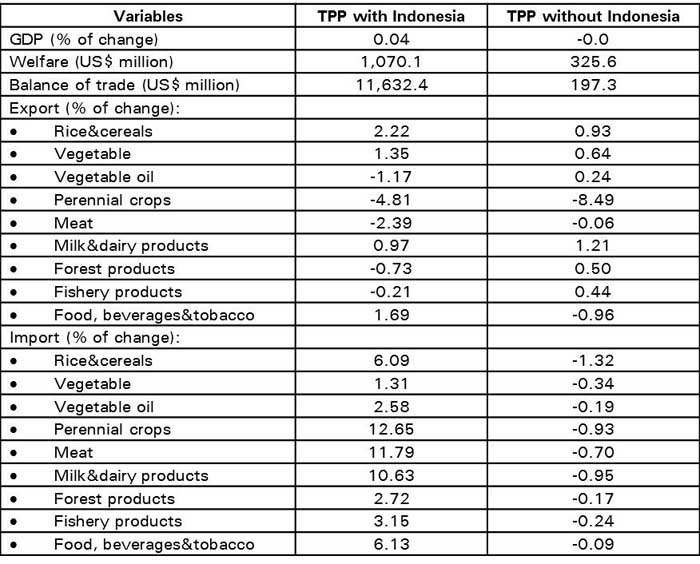Introduction
The TPP is one of the largest trading blocks representing roughly 40% of the world economy (combined GDP of US$ 28.1 trillion), and involving more than 792 million population in 12 countries. Content of the TPP is considered highly progressive, because it includes some issues beyond WTO, such as policy harmonization among member countries to reduce transaction costs, competition policies, government procurement, intellectual property rights (IPR), and investment. Therefore, the TPP is promoted as “high quality free trade agreement” or “high standard agreement”.
In response to this agreement, in 2011 Indonesia declined to join the TPP to protect domestic industries, and Indonesia has been committed to 12 other trade agreements in 2010. Expansion of high standard free trade agreement will cause Indonesian export-import access become too broad which ultimately will threaten domestic products and labor. However, on a meeting with President Joko Widodo and Presiden Barack Obama in October 2015, Indonesia showed its interest to join the TPP.
By joining the TPP, there is ample opportunity for Indonesia to expand its trade relations with developed countries, and members of the TPP. Indonesia will take advantage of lower tariff in exporting some products to member countries. On the other hand, Indonesia also has to adjust some of its domestic policies which may threaten the country’s sovereignty. Some analysts argue that by joining a broader trading block, Indonesia will end up with producing raw materials and market destinations of other developed countries. In recent years, Indonesia has lost its competitive advantage compared to other ASEAN member states.
The purpose of this paper is to address some potential impacts of joining or not joining the TPP, particularly for Indonesian agriculture and the corresponding policies to address the issues. Analyses on the impacts of TPP is based on a Computable General Equilibrium (CGE) model (Octaviani, 2016).
Indonesian agriculture trade with TPP countries
Agriculture exports of Indonesia to the TPP countries fluctuate overtime but show a declining trend at 2.0%/annum (Table 1). The USA and Malaysia are two major export destinations with almost equal share around 28.0% during 2011-2014. The next destination of Indonesian agriculture export are Singapore and Japan with average share of 16.8% and 13.0% respectively. The largest growth was export to Peru (25.1%), followed by Australia (18.3%), Chile (17,2%), New Zealand1(7.0%) and USA (16.2%). On the contrary, export to Malaysia, Singapore, and Japan showed a declining trend with a corresponding rate of 22.2%, 3.2%, and 1.1%/annum.
Trend of agricultural products imports from the TPP countries is presented in Table 2. In contrast to exports, the trend of agricultural imports fluctuates over 2011-2014, but showed a minor increase at the rate of 0.1% /annum. Within 12 TPP member countries, Australia and the USA are two major sources of Indonesian agricultural imports, with combined share of 65.9%. Major commodities imported from Australia are beef cattle and wheat, whereas from the US Indonesia imports soybean (grain and meal), wheat, and fruits. Other major exporting countries are Malaysia (7.6%), Canada (7.1%), and New Zealand (6.7%).
Tab1e 1. Export of agriculture products from Indonesia to the TPP member countries, 2011-2014 (US$ thousand)

Source: Trademap, 2011-2014, as cited by MoA, 2016
Table 2. Trend of Indonesian agricultural import from the TTP countries, 2011-2014 (US$ thousand)

Source: Trademap, 2011-2014, as cited by MoA, 2016
Agricultural imports from Vietnam dan Meksiko showed a declining trend at the corresponding rate of 43.6% and 43.0% respectively. Likewise, imports from Japan, Chile, Malasia, and Singapore were also declining. On the other hand, imports from Australia increased at the rate of 7.4%, followed by Peru (4,1%), New Zealand (4.0%), Canada (3.9%) and the US (3.1%).
In terms of trade balance, Indonesia showed a surplus with an average of US$ 956.5 thousand in 2011-2014 (Table 3). The largest surplus is originated from trade with Malaysia at an average of US$ 1.9 million, followed by trade with Singapore (US$ 1.2 million) and Japan (US$ 1.1 million). On the other hand, Indonesian trade with Australia showed the largest deficit with an average of US$ 2.5 million, followed by trade with Canada (US$ 490,300 thousand) and New Zealand (US$ 379.2 thousand).
Table 3. Agriculture trade balance of Indonesia and TPP countries, 2011-2014 (US$ thousand)

In terms of agriculture investments, Singapore and Malaysia are two of the largest sources of investments in Indonesian agriculture. During 2010-2014, average agriculture investments from Singapore was US$ 632.7 million which increase at the rate of 17.5%/annum. Agriculture investment from Malaysia reached an average of US$% 328.8 million with the growth rate of 12.3%/annum.
The potential impact of joining or not-joining the TPP to agriculture sector
There has been an issue among policy makers and trade analysts whether or not Indonesia is ready to join the TPP. What are the consequences for Indonesia, particularly in agriculture, from joining or not joining the TPP? Partial answer to these questions are discussed on the following paragraphs.
According to Octaviani (2016), by joining the TPP the corresponding impact to Indonesian GDP is very small (0.04%) and almost no impact to GDP if Indonesia is not joining the trade accord (Table 4). However, it is interesting to note that if Indonesia joins the TPP, the impact to GDP of Vietnam and Malaysia is much larger (0.71% and 0.26% respectively). This observation indicates that these two ASEAN member states are enjoying the benefit of higher market access to Indonesia.
Table 4. The potensial impacts of joining or not joining the TPP to macro economic and agriculture of Indonesia

Source: Octaviani (2016)
Overall impact to Indonesian’s welfare is worth to note. By joining the TPP, the economic welfare is estimated to increase by US$ 1,070.1 million which intuitively originated from diversified and lower price of imported products from the TPP countries. On the contrary, if Indonesia does not join the TPP, then the country will lose the opportunity to access lower cost of imported products which ultimately can lead to welfare loss of US$ 325.1 million.
On the trade aspect, the analysis shows that if Indonesia joins the TPP then the country will suffer from trade deficit of US$ 1,632.4 million which again indicates that Indonesia will be a market for various products exported from the TPP countries. On the other hand, by not joining the TPP, Indonesia will still enjoy trade balance surplus of US$ 197.3 million due to lower imports from the TPP countries.
Specific to the agriculture sector, by joining the TPP, Indonesia is predicted to have larger imports on perenial crops, meat, milk and dairy products. On the other hand, if not joining the TPP then import of these products will slightly decline. Furthermore, another impact of joining the TPP Indonesia is predicted to experience lower exports in some products such as vegetable oil, particularly palm oil, perenial crops, and fishery products, but exports of food, beverages and tobacco will increase. If Indonesia does not join the TPP, exports of vegetable oil and fishery products will still increase at the expense of lower exports of food, beverages and tobacco.
In assessing the impacts of the TPP, it is necessary to consider to what extent Indonesia can currently participate in a bilateral and regional Free Trade Agreement (FTA). In addition to bilateral commitments, Indonesia has been actively involved in major regional trade agreements. Along with Brunei Darusalam, Malaysia, Singapore, and Vietnam, Indonesia is a member of the ASEAN which is committed to implement the ASEAN Economic Community (AEC). To some extent, Japan also engages with the ASEAN through ASEAN Plus Three framework along with China and Korea, in addition to the spesific cooperation under ASEAN-Japan. Preferential trade agreements have also been developed with Australia and New Zealand both within bilateral framework or broader cooperation framework under ASEAN-Australia and New Zealand.
Under those regional cooperation framework, agreements related to some commodities is still listed in a sensitive list which are exempted from tariff reduction and other similar commitments. If Indonesia joins the TPP, which will require more ambitious trade liberalization, then some commodities such as rice and sugar will be threathened.
CONCLUSION
By joining the TPP, the agriculture sector is predicted to have larger imports on some commodities such as perenial crops, meat, milk and dairy products. Furthermore, another impact of joining the TPP is that Indonesia is predicted to experience lower exports of some products such as vegetable oil, perenial crops, and fishery products, but exports of food, beverages and tobacco will increase. The analysis also shows that if Indonesia joins the TPP, then the country will suffer from trade deficit of US$ 1,632.4 million. The corresponding impacts of joining the TPP to GDP is not significant.
If Indonesia decides to join the TPP, two general points should be considered, namely: (a) the country should focus more on improvement of its economic competitiveness (infrastructures, logistic and connectivity); (b) anticipate economic and non-economic consequences of increase in import. If for some reason Indonesia is not yet joining the TPP, then the country will lose the opportunity of tapping higher market access.
REFERENCES
Ministry of Agriculture. 2016. “ Analyses on the impact of joining or not joining the Trans Pacific Partnership (TPP) to Indonesian agriculture”, Research Report, Ministry of Agriculture, Jakarta.
Octaviani, R. 2016. “Indonesian status on economic integration”, presentation on Development Analysis Forum: Indonesia on economic integration, Faculty of Economic and Manajemen, Bogor Agricultural University, Bogor, 30 March 2016.
|
Date submitted: Sept. 7, 2016
Reviewed, edited and uploaded: Sept. 7, 2016
|


The Potential Impacts of Trans Pacific Partnership (TPP) on Indonesian Agriculture
Introduction
The TPP is one of the largest trading blocks representing roughly 40% of the world economy (combined GDP of US$ 28.1 trillion), and involving more than 792 million population in 12 countries. Content of the TPP is considered highly progressive, because it includes some issues beyond WTO, such as policy harmonization among member countries to reduce transaction costs, competition policies, government procurement, intellectual property rights (IPR), and investment. Therefore, the TPP is promoted as “high quality free trade agreement” or “high standard agreement”.
In response to this agreement, in 2011 Indonesia declined to join the TPP to protect domestic industries, and Indonesia has been committed to 12 other trade agreements in 2010. Expansion of high standard free trade agreement will cause Indonesian export-import access become too broad which ultimately will threaten domestic products and labor. However, on a meeting with President Joko Widodo and Presiden Barack Obama in October 2015, Indonesia showed its interest to join the TPP.
By joining the TPP, there is ample opportunity for Indonesia to expand its trade relations with developed countries, and members of the TPP. Indonesia will take advantage of lower tariff in exporting some products to member countries. On the other hand, Indonesia also has to adjust some of its domestic policies which may threaten the country’s sovereignty. Some analysts argue that by joining a broader trading block, Indonesia will end up with producing raw materials and market destinations of other developed countries. In recent years, Indonesia has lost its competitive advantage compared to other ASEAN member states.
The purpose of this paper is to address some potential impacts of joining or not joining the TPP, particularly for Indonesian agriculture and the corresponding policies to address the issues. Analyses on the impacts of TPP is based on a Computable General Equilibrium (CGE) model (Octaviani, 2016).
Indonesian agriculture trade with TPP countries
Agriculture exports of Indonesia to the TPP countries fluctuate overtime but show a declining trend at 2.0%/annum (Table 1). The USA and Malaysia are two major export destinations with almost equal share around 28.0% during 2011-2014. The next destination of Indonesian agriculture export are Singapore and Japan with average share of 16.8% and 13.0% respectively. The largest growth was export to Peru (25.1%), followed by Australia (18.3%), Chile (17,2%), New Zealand1(7.0%) and USA (16.2%). On the contrary, export to Malaysia, Singapore, and Japan showed a declining trend with a corresponding rate of 22.2%, 3.2%, and 1.1%/annum.
Trend of agricultural products imports from the TPP countries is presented in Table 2. In contrast to exports, the trend of agricultural imports fluctuates over 2011-2014, but showed a minor increase at the rate of 0.1% /annum. Within 12 TPP member countries, Australia and the USA are two major sources of Indonesian agricultural imports, with combined share of 65.9%. Major commodities imported from Australia are beef cattle and wheat, whereas from the US Indonesia imports soybean (grain and meal), wheat, and fruits. Other major exporting countries are Malaysia (7.6%), Canada (7.1%), and New Zealand (6.7%).
Tab1e 1. Export of agriculture products from Indonesia to the TPP member countries, 2011-2014 (US$ thousand)
Source: Trademap, 2011-2014, as cited by MoA, 2016
Table 2. Trend of Indonesian agricultural import from the TTP countries, 2011-2014 (US$ thousand)
Source: Trademap, 2011-2014, as cited by MoA, 2016
Agricultural imports from Vietnam dan Meksiko showed a declining trend at the corresponding rate of 43.6% and 43.0% respectively. Likewise, imports from Japan, Chile, Malasia, and Singapore were also declining. On the other hand, imports from Australia increased at the rate of 7.4%, followed by Peru (4,1%), New Zealand (4.0%), Canada (3.9%) and the US (3.1%).
In terms of trade balance, Indonesia showed a surplus with an average of US$ 956.5 thousand in 2011-2014 (Table 3). The largest surplus is originated from trade with Malaysia at an average of US$ 1.9 million, followed by trade with Singapore (US$ 1.2 million) and Japan (US$ 1.1 million). On the other hand, Indonesian trade with Australia showed the largest deficit with an average of US$ 2.5 million, followed by trade with Canada (US$ 490,300 thousand) and New Zealand (US$ 379.2 thousand).
Table 3. Agriculture trade balance of Indonesia and TPP countries, 2011-2014 (US$ thousand)
In terms of agriculture investments, Singapore and Malaysia are two of the largest sources of investments in Indonesian agriculture. During 2010-2014, average agriculture investments from Singapore was US$ 632.7 million which increase at the rate of 17.5%/annum. Agriculture investment from Malaysia reached an average of US$% 328.8 million with the growth rate of 12.3%/annum.
The potential impact of joining or not-joining the TPP to agriculture sector
There has been an issue among policy makers and trade analysts whether or not Indonesia is ready to join the TPP. What are the consequences for Indonesia, particularly in agriculture, from joining or not joining the TPP? Partial answer to these questions are discussed on the following paragraphs.
According to Octaviani (2016), by joining the TPP the corresponding impact to Indonesian GDP is very small (0.04%) and almost no impact to GDP if Indonesia is not joining the trade accord (Table 4). However, it is interesting to note that if Indonesia joins the TPP, the impact to GDP of Vietnam and Malaysia is much larger (0.71% and 0.26% respectively). This observation indicates that these two ASEAN member states are enjoying the benefit of higher market access to Indonesia.
Table 4. The potensial impacts of joining or not joining the TPP to macro economic and agriculture of Indonesia
Source: Octaviani (2016)
Overall impact to Indonesian’s welfare is worth to note. By joining the TPP, the economic welfare is estimated to increase by US$ 1,070.1 million which intuitively originated from diversified and lower price of imported products from the TPP countries. On the contrary, if Indonesia does not join the TPP, then the country will lose the opportunity to access lower cost of imported products which ultimately can lead to welfare loss of US$ 325.1 million.
On the trade aspect, the analysis shows that if Indonesia joins the TPP then the country will suffer from trade deficit of US$ 1,632.4 million which again indicates that Indonesia will be a market for various products exported from the TPP countries. On the other hand, by not joining the TPP, Indonesia will still enjoy trade balance surplus of US$ 197.3 million due to lower imports from the TPP countries.
Specific to the agriculture sector, by joining the TPP, Indonesia is predicted to have larger imports on perenial crops, meat, milk and dairy products. On the other hand, if not joining the TPP then import of these products will slightly decline. Furthermore, another impact of joining the TPP Indonesia is predicted to experience lower exports in some products such as vegetable oil, particularly palm oil, perenial crops, and fishery products, but exports of food, beverages and tobacco will increase. If Indonesia does not join the TPP, exports of vegetable oil and fishery products will still increase at the expense of lower exports of food, beverages and tobacco.
In assessing the impacts of the TPP, it is necessary to consider to what extent Indonesia can currently participate in a bilateral and regional Free Trade Agreement (FTA). In addition to bilateral commitments, Indonesia has been actively involved in major regional trade agreements. Along with Brunei Darusalam, Malaysia, Singapore, and Vietnam, Indonesia is a member of the ASEAN which is committed to implement the ASEAN Economic Community (AEC). To some extent, Japan also engages with the ASEAN through ASEAN Plus Three framework along with China and Korea, in addition to the spesific cooperation under ASEAN-Japan. Preferential trade agreements have also been developed with Australia and New Zealand both within bilateral framework or broader cooperation framework under ASEAN-Australia and New Zealand.
Under those regional cooperation framework, agreements related to some commodities is still listed in a sensitive list which are exempted from tariff reduction and other similar commitments. If Indonesia joins the TPP, which will require more ambitious trade liberalization, then some commodities such as rice and sugar will be threathened.
CONCLUSION
By joining the TPP, the agriculture sector is predicted to have larger imports on some commodities such as perenial crops, meat, milk and dairy products. Furthermore, another impact of joining the TPP is that Indonesia is predicted to experience lower exports of some products such as vegetable oil, perenial crops, and fishery products, but exports of food, beverages and tobacco will increase. The analysis also shows that if Indonesia joins the TPP, then the country will suffer from trade deficit of US$ 1,632.4 million. The corresponding impacts of joining the TPP to GDP is not significant.
If Indonesia decides to join the TPP, two general points should be considered, namely: (a) the country should focus more on improvement of its economic competitiveness (infrastructures, logistic and connectivity); (b) anticipate economic and non-economic consequences of increase in import. If for some reason Indonesia is not yet joining the TPP, then the country will lose the opportunity of tapping higher market access.
REFERENCES
Ministry of Agriculture. 2016. “ Analyses on the impact of joining or not joining the Trans Pacific Partnership (TPP) to Indonesian agriculture”, Research Report, Ministry of Agriculture, Jakarta.
Octaviani, R. 2016. “Indonesian status on economic integration”, presentation on Development Analysis Forum: Indonesia on economic integration, Faculty of Economic and Manajemen, Bogor Agricultural University, Bogor, 30 March 2016.
Date submitted: Sept. 7, 2016
Reviewed, edited and uploaded: Sept. 7, 2016